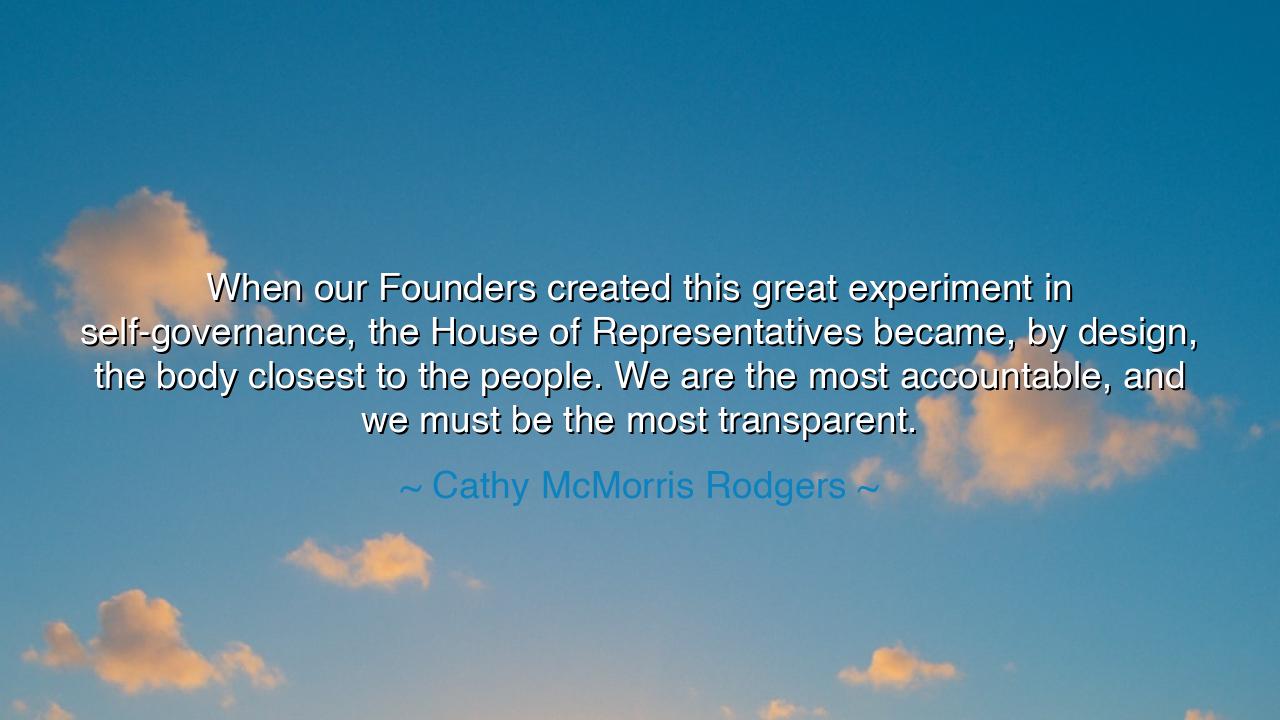
When our Founders created this great experiment in
When our Founders created this great experiment in self-governance, the House of Representatives became, by design, the body closest to the people. We are the most accountable, and we must be the most transparent.






In the words of Cathy McMorris Rodgers, spoken with reverence for the roots of democracy, there shines a reminder both solemn and stirring: “When our Founders created this great experiment in self-governance, the House of Representatives became, by design, the body closest to the people. We are the most accountable, and we must be the most transparent.” These are not words of ceremony but of duty — a call to remembrance and responsibility. For they summon us back to the sacred idea upon which the American republic was founded: that power flows not from the ruler to the ruled, but from the people to their representatives, and that such power must always be wielded in the light of transparency.
The origin of this insight reaches into the heart of the eighteenth century, when a band of visionaries — the Founding Fathers — stood against the tide of monarchy and empire. They sought to create what had never been fully realized before: a nation governed by its citizens, not merely in name, but in truth. To achieve this, they constructed a system both delicate and enduring, a balance of powers and principles. At the core of that system stood the House of Representatives, the chamber designed to echo most clearly the voice of the people. Unlike the Senate, whose members once were chosen by state legislatures, the House was born of direct election, its members tied not to crowns or titles, but to the heartbeat of communities.
McMorris Rodgers’s words remind us that this design was no accident, but a deliberate act of faith — faith in the judgment, wisdom, and virtue of ordinary citizens. The Founders understood that liberty cannot survive where government grows distant from the governed. Thus, they made the House of Representatives the most accountable of all institutions: its members elected every two years, its debates public, its actions visible. They believed that frequent accountability would keep corruption at bay and ensure that the people’s will remained the compass of the nation’s course.
But with accountability comes transparency, that sacred twin of democracy. For how can the people judge their leaders if the workings of power are hidden behind closed doors? To be transparent is not a weakness of governance — it is its highest strength. It is the courage of a nation that trusts its citizens with truth. McMorris Rodgers reminds us that self-governance cannot live in shadow; it must breathe in the open air, where the people may see and understand. For a government that conceals its actions ceases to be of the people; it becomes once more the master, not the servant.
Consider the example of James Madison, who, though quiet in manner, was fierce in conviction. When he helped draft the Constitution, he argued that the House should be “immediate representatives of the people,” bound by election to serve not themselves but the republic’s greater good. His vision was proven in the centuries that followed. When corruption has crept into politics, it was not kings who corrected it, but the light of public scrutiny — the power of transparency and the voice of the people awakened. From the Progressive reformers of the early twentieth century to the civil rights champions of the 1960s, change was made possible because citizens could see, could speak, could hold accountable those who acted in their name.
McMorris Rodgers’s words, though spoken in a modern age of technology and speed, echo the timeless principle that representation is not a privilege; it is a trust. Those who serve in the House of Representatives are not owners of power but stewards of it, and their legitimacy depends upon their openness. In a time when cynicism grows and faith in institutions falters, her reminder is vital: that transparency and accountability are not burdens placed upon leaders — they are the lifeblood of democracy itself.
And so, O listener, take this lesson into your heart: the work of self-governance is not the task of a few, but the duty of all. The people must demand transparency, and their representatives must live by it. Do not withdraw into silence when you see injustice, nor surrender your vigilance when power tempts secrecy. Remember that freedom’s endurance depends upon your voice, your attention, your care.
For as Cathy McMorris Rodgers teaches, democracy is not a monument to be admired; it is a living experiment, renewed each generation by those who cherish its light. The House, built to be closest to the people, can only remain so if the people themselves remain close — watching, questioning, participating. Thus, let every citizen be both ruler and guardian, both servant and sovereign, ensuring that the light of accountability never dims and that the transparency of truth forever illuminates the halls of power.






AAdministratorAdministrator
Welcome, honored guests. Please leave a comment, we will respond soon